“We Are Not Animals!” Italy’s Racial Riots and Their Aftermath
"Those guys were firing at us as if it was a fairground," one of the men told La Repubblica newspaper. "They were laughing, I was screaming, other cars were passing by but nobody stopped them."
The reaction to the events was furious. More than 2,000 African immigrants, most of whom employed illegally as farm laborers, blamed the episode on racism and gathered in the town centre to demonstrate against the shooting and their living and working conditions. Some chanted "We are not animals", others carried placards saying "Italians here are racist." Their protest continued leading to violence in the streets of Rosarno; the crowd set cars on fire, stoned the police, attacked residents and smashed shop windows. Police said that at least 60 people were wounded, including immigrants themselves, locals and policemen.
This situation lasted three days. Some Italian residents, armed with iron bars and wooden staves, erected roadblocks next to buildings where immigrant farm workers live. Some local people occupied the City Council building demanding that the police cleared the immigrants out of the town. Domenico Ventre, the former head of civil protection department of Rosarno's council, condemned the rioting. "In Rosarno the immigrants are well cared of, and their reaction to this isolated episode is disproportionate," he said. "We cannot accept that they destroy our town and scare the citizens." Other citizens, afraid to venture into the streets, holed up in their homes, the media reported. "You would step out and buy some bread only because you have to eat, but if I could choose I wouldn't go out for an evening walk," said Renato Cortese, a top police official interviewed for the evening news.
The Minister of Interior, Roberto Maroni, in charge of State Police, sent over 200 police officers because of the highly inflamed situation; schools and shops were closed. Those who were injuried more seriously were three immigrants: two were beaten up with metal bars, doctors at the emergency room in a hospital near Rosarno said. One had kidney surgery and the other was treated for an eye socket fracture. A third was taken to Reggio Calabria for brain surgery.
Several immigrants were arrested together with some Italians including two who tried to hit the demonstrators with their vehicles. Calm was generally restored on Saturday 9, with barricades erected by locals dismantled and shops open.
Authorities, applauded by the locals, transferred more than 1,000 people, mostly illegal temporary workers from sub-Saharan Africa, to immigrant centres around Italy in an operation that lasted throughout Sunday. Even workers with regular residence permits left the town to escape a situation that a political commentator compared to the Ku Klux Klan racial violence in the United States in the 1960s. Immigrants without regular papers risk expulsion to their country of origin as the authorities began demolishing their former makeshift homes in Rosarno. Minister Maroni said the government had "brilliantly restored public order" and thanked the police for organizing the exodus "in an exemplary way."
A protest of such magnitude was never seen in Italy before, despite frequent episodes of intolerance against immigrants—some reported by the media and many, too many, remaining untold for fear or humiliation.
This time, though, something new happened. Hunger exploded. Immigrants had been camping out in tents and cardboard shelters within an abandoned cheese factory with no heating, running water or electricity on the outskirts of Rosarno. Human rights groups add that they are easily exploited by organized crime. Rosarno's priest, Don Carmelo Ascone, described their living conditions as "something similar to Dante's Inferno".
According to the CGIL public sector union, about 26,400 immigrants were employed in Calabria's agriculture sector in 2007; fewer than 7,000 of them held regular working permits, a situation which is common all over Italy. And immigrants in Calabria add they earn illegally low wages, as little as 20 euros ($30) for a 12-hour day picking citrus fruit and other crops. Despite chronically high unemployment rates in Italy's underdeveloped South, many residents refuse to do the backbreaking seasonal farm work. This, coupled with frequent episodes of racism and intolerance, eventually sparked the riots in Rosarno.
This spiral of violence stirred many reactions in the country. Opposition politicians accused Premier Silvio Berlusconi's coalition, which includes an openly xenophobic party, the Lega Nord, of failing to allow the immigrants to find proper housing and jobs, which are necessary to obtain regular residence permits. Minister Maroni, a member of the Lega Nord party, replied by suggesting that the violence resuted from a general failure to address the issue of illegal workers in the country. "The situation in Rosarno, like in other places, is difficult because illegal immigration—which feeds criminal activities—has been tolerated for years and nothing effective was never done about it," he told La Repubblica newspaper. But the leader of the centre-left Democratic Party Pierluigi Bersani commented that it is Berlusconi and the right-wing that have been governing the country for most of the past decade: "Maroni is passing the buck ... We have to go to the roots of the problem: mafia, exploitation, xenophobia, and racism."
The right-wing daily Il Giornale, owned by the family of Prime Minister Silvio Berlusconi, agreed that illegal immigrants should be kept out of the country. However, it added: "Once they are here, they cannot be shamefully exploited and shot at while they accept jobs that our unemployed sneer at."
Father Luigi Ciotti, founder of the anti-mafia association Libera, pointed the finger at the 'Ndrangheta, the local criminal organization that dominates Calabria. "The mafia, which controls the region, cynically and pitilessly exploits the immigrants," he told the daily La Stampa. "The criminal bosses know that illegal immigrants cannot even try to rebel because they have no identity documents and therefore no protection from the state." According to Italy's main trade union CGIL, about 50,000 immigrant workers in Italy live in poor conditions similar to those in Rosarno. The union also accused the mafia of controlling the “industry” of illegal labor saying that immigrants are paid "miserable salaries and have terrible hours, similar to slavery".
Agazio Loiero, the governor of the Calabria region and a member of the Democratic Party, told Sky TV that the violence was "unacceptable" but that the migrants had been "strongly provoked."
Pope Benedict departed from the prepared text of his weekly Angelus blessing to appeal for tolerance. "An immigrant is a human being, different in origin, culture and tradition but he is a person with rights and duties who must be respected," he told the crowd in Saint Peter's Square.
These words peace seem so far from the nightmare of Rosarno where tolerance was a mere word, a mirage in a desert of resentment, in a war of poor against poor. It is impossible to forget the images of the riots on television, the rage of exasperated locals, or those mothers holding their children, protesting under the windows of the Town Hall, yelling "Bastards! Shame on you!" against those who fed the immigrants after hours of absurd, surreal and yet so real fight.
Is this the real face of Italy? Is this Calabria? Just two months ago, at the 10th Summit of the Nobel Peace Laureates in Berlin German director Wim Wenders told a different story about Calabria, where he recently shot his latest movie “The Flight”. Based on a true story, the movie is about two towns, Badolato and Riace, that opened some of the houses abandoned by Calabrian emigrants to foreign refugees, making a true miracle of social integration. Wenders described this experience as “the most beautiful thing of my life,” addying: “Utopia is not the fall of Berlin Wall, but what I witnessed there. People often talk of a global village and I believe that those two Calabrian towns are the perfect metaphor of this idea.”






























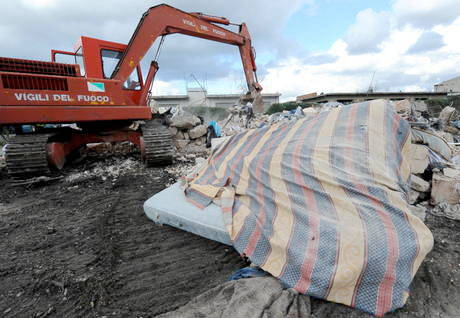
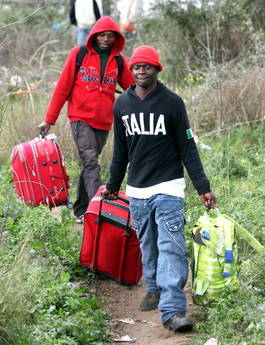
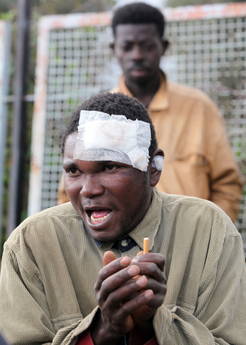
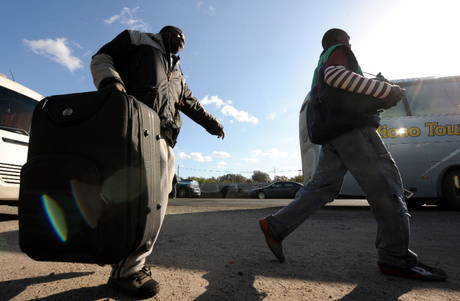
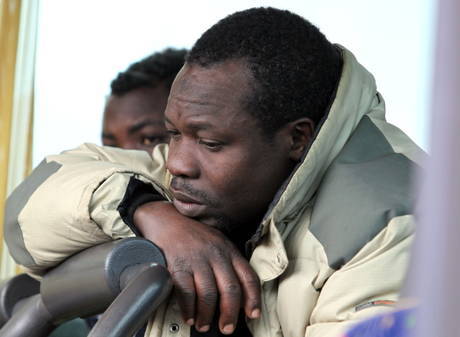
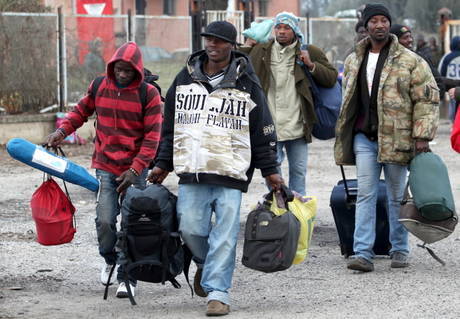
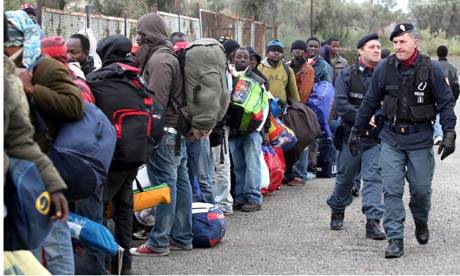
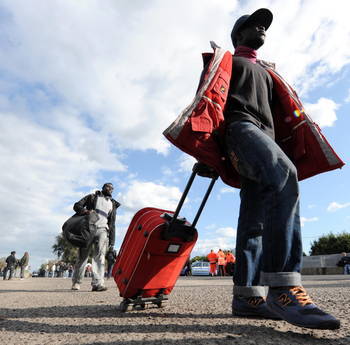
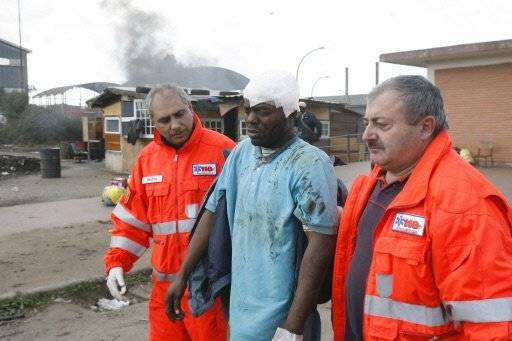
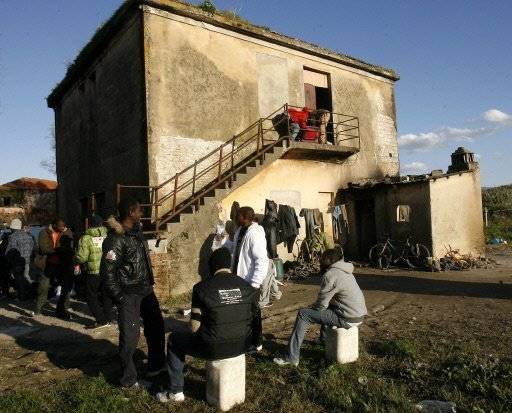





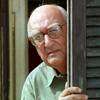

i-Italy
Facebook
Google+
This work may not be reproduced, in whole or in part, without prior written permission.
Questo lavoro non può essere riprodotto, in tutto o in parte, senza permesso scritto.